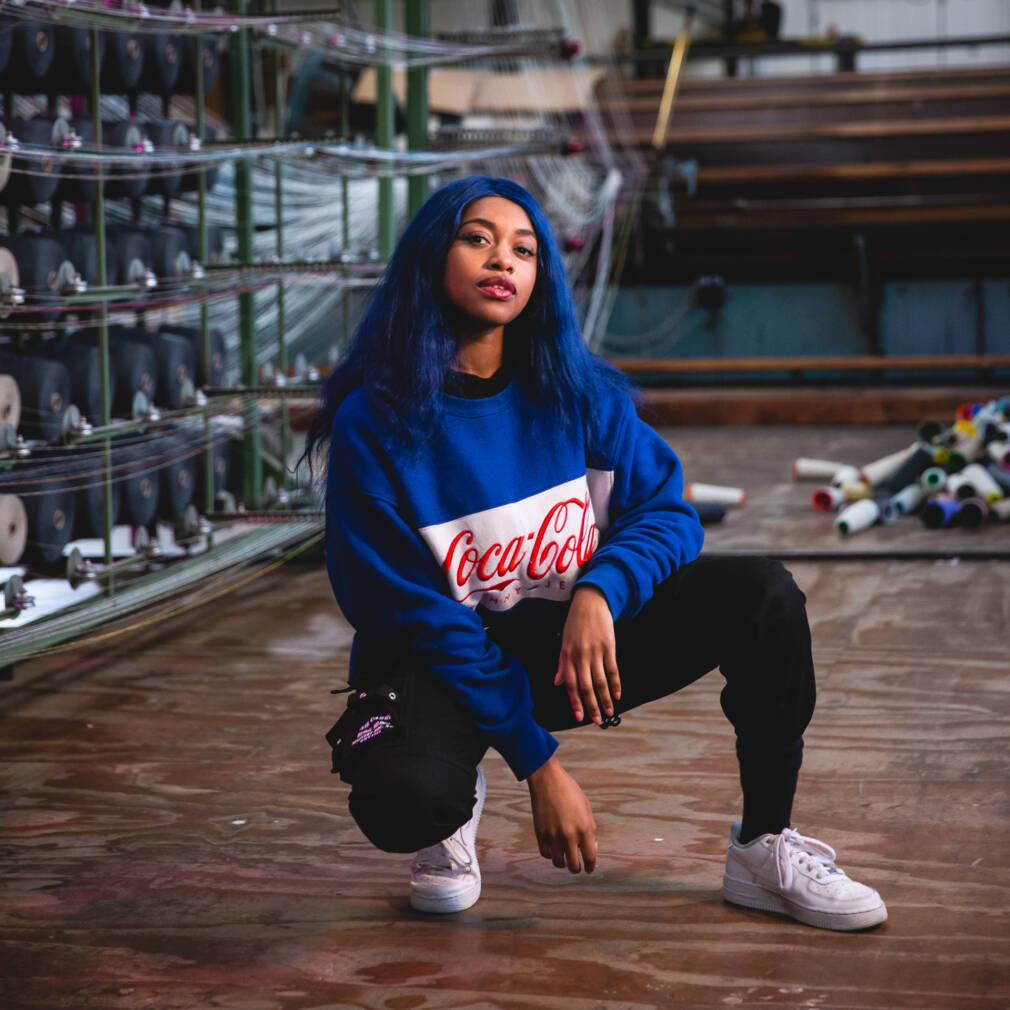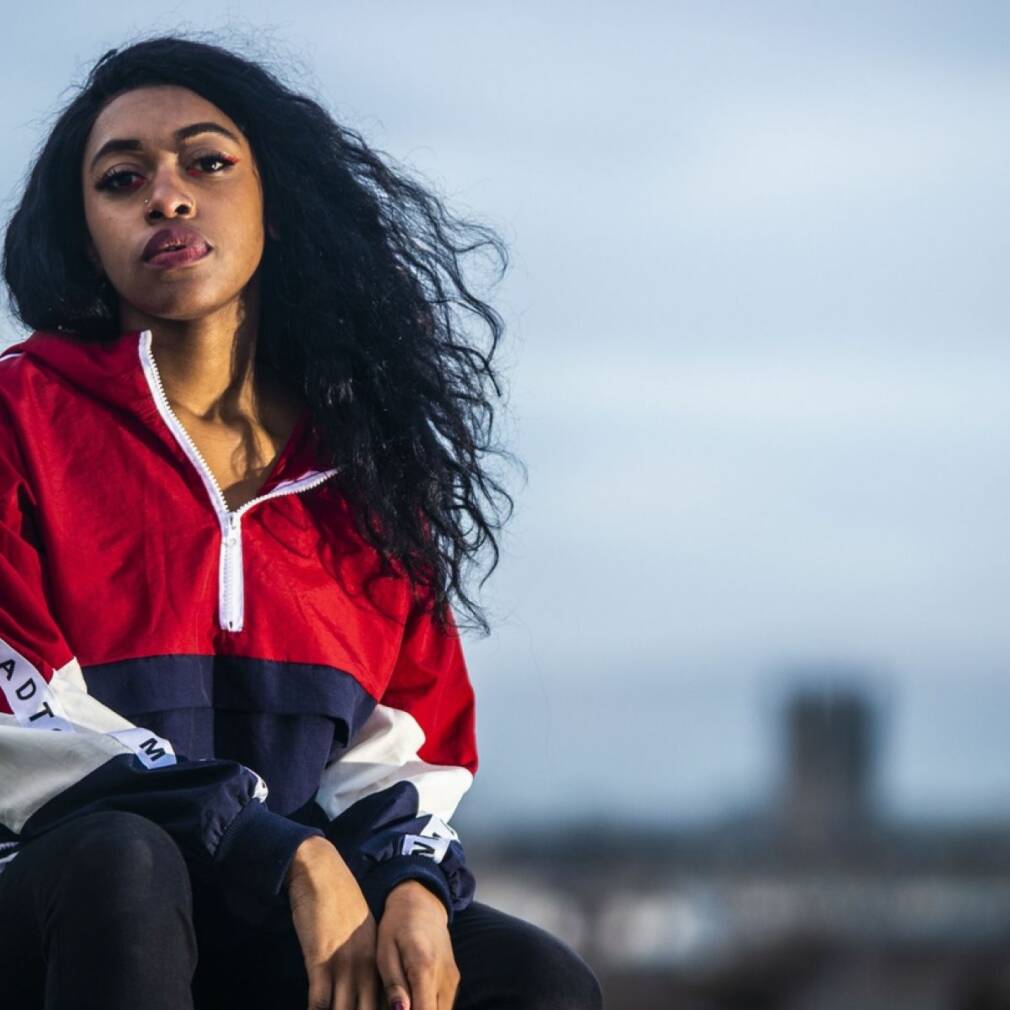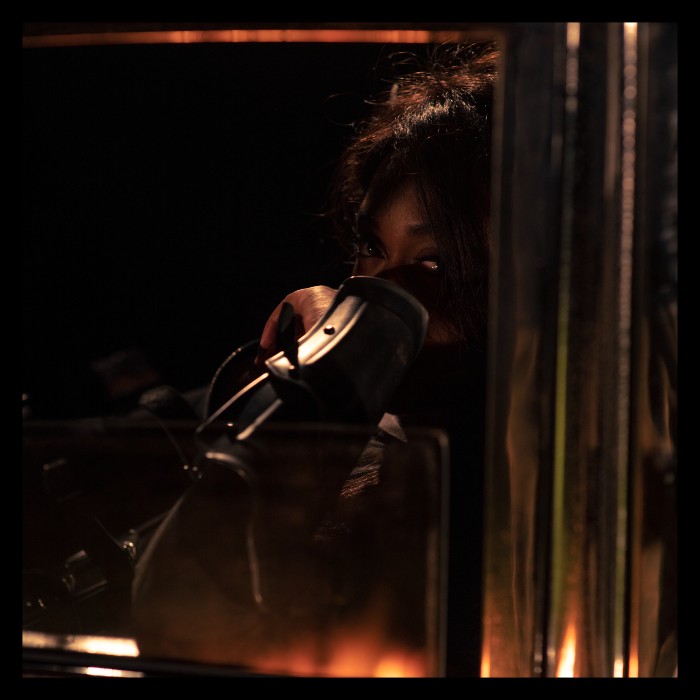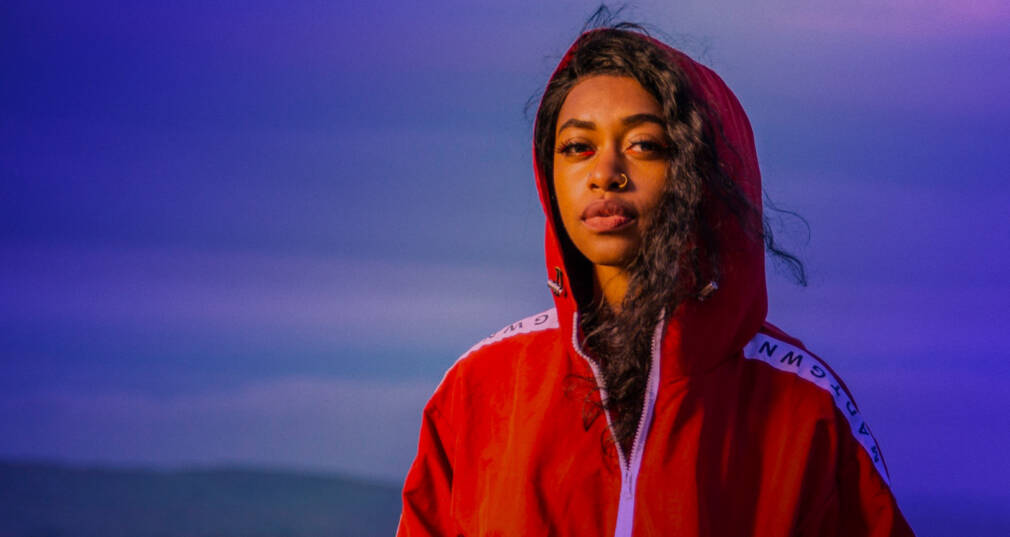Paris. We caught up with Denise Chaila backstage after an emotional Pitchfork Paris performance. The singer-songwriter-rapper, multi-hyphenate talent isn’t afraid of being vulnerable. In fact, she embraces it. During the show Denise took the time to preach, in the best sense of the term, about safe spaces, her tribulations in music, the hard facts of life, and the tear jerking inspiration behind some of her new tracks. If one message was clear it was, “come as you are” and for those who don’t accept that, well they can fuck off.
Denise Chaila is a Limerick based artist and after many years on the scene and a 2016 appearance on the Rusangano Family album Let the Dead Bury the Dead, released her debut EP Duel Citizenship in 2019. The debut was met with critical acclaim, praised for its lyrical quality and activist sensibility. The eponymous track is a poetic exploration of Denise’s Zambian-Irish heritage and the confrontations with identity and society singing, “I could show you the spirit of Lucan, Limerick, and Lusaka.”
Born in Zambia, Denise moved to Ireland at the age of 3, and this unique perspective has proven a wellspring for her creative expression. One of Denise’s most popular singles “Chaila”, for example, is a humorous and biting critique of those who cannot, or refuse to try, pronouncing her name correctly. Her music also includes plenty of Bemba vocabulary (one of Zambia’s seven national languages) and a proud display of regional myth.
Her music is also imbued with references and allegories that could fill an English university literature course. Whether it’s her clever play on words with “Oscar Wilde out” on “Galileo”, reimagining the spirit of Irish mythology via Cú Chulainn, or the Ken Loach shoutout via “the wind that shakes the barley on “Duel Citizenship”, Denise is reclaiming her culture in an exciting and accessible way.
Overall, Denise’s music is equal parts activism, myth, and bossy bars that take aim at all institutions of injustice. To get a deeper look into this complex artist’s thought process, experience, perspective, and the rundown on the emerging Limerick rap scene, we sat down backstage with a glass of prosecco and a notebook full of questions.
You mentioned on stage that you are chaos in the system. What do you mean by that?
I mean that every so often I run into someone who is so confused by me and who’s really adamant that they want to try to make me fit into a box. It’s frustrating that you can’t just say I’m from one place. It’s frustrating that I demand the respect that you say my name correctly.
I do not want to make systems of white supremacy comfortable around me. And that means having a certain kind of attitude.
I made friends off the back of saying audacious things like gender is a construct, Race is a biological fiction, but a social fact, and I am here to cause chaos in the lives and the hearts of white supremacists homophobes and anybody who wants to shut me up.
Where did this engagement with those systems come from? Intellectually and artistically?
I’m a Christian. And what I believe that means is that you have to be willing at any moment to put your life on the line for other people’s safety. For their joy and for the purpose in their lives, you know? Like I think that what that means is that you have to wake up every morning, prepared to fight hard for other people to be recognized as human and real and worthy.
I grew up with a father who was like half a pastor preaching to me about like, Being tiny and slaying giants, you know, preaching to me about like, you know, walking into a lion’s den and sitting down and waking up unharmed. From that wellspring, everything in my life comes.

There’s also a lot of references to mythology in your music. Is this coming from the same place?
Any story that exists, I think tells me enough about the person who’s telling it, or the culture it came from to honor it. I really believe in honoring elders, honoring alters and honoring stories. And when you start to do that, you start to see which stories are worth your honor, and which are worth your disdain.
I connected with Irishness first off of the back of mythology, because what people would say about the good folk and the Fe and the little people and the good people of the hill.. That was very similar to what I would hear people discussing back in Zambia about like spirits. You know, if you think about voodoo about Hoodoo, it’s not the same, it’s not synonymous, but like there are certain through lines. You can recognize that Loki and Anansi have the same spirit.. Anansi is like a God, a spirit, in African mythology, a trickster, you know? The clever Kalulu in Zambia, meaning hare.
These are things that kind of pop up again and again and again. Everybody has this idea of a grandfatherly grandmotherly person who sits by a fire, telling you stories about where you’re from, and mythology essentially is a story about where we’re from. And it’s not so much about whether it’s true or not, but it’s about what it says about you.
I think it’s why people who love rap love anime. Anime is a form of mythology too.
There’s one thing I want to pick up on that you mentioned just a little bit ago on speaking truth to power. A song that embodies that phrase to me is “Duel Citizenship”. What were you trying to express there?
Every time I do this poem, I connect with people and I make friends. Even if it’s just a fleeting moment there’s like a connection of the eyes even if I never see that person again. Because people need to be told that they’re not strange for not fitting in boxes. And people don’t fit in boxes.
The human brain has this very understandable, but always weird tendency to want to make you fit somewhere and squish you into some understanding and definition.
And Duel Citizenship for me was like a period. It was like a full stop at the end of a long sentence where people had been challenging me about my belonging and about my right to exist in certain spaces. Whether that be Irish spaces, white spaces, Zambian spaces, black spaces, queer spaces, straight spaces, whatever the case may be.
Spaces were excluded from me. And I was being asked constantly to deny one aspect of my identity in order to embrace another aspect of my identity. And I don’t believe you have to do that.
And how did your Zambian background inform your worldview?
The truth is, I don’t know. I’m still figuring that out actually.
Me and my sister, we used to say that when we’re in Ireland, we’re considered Zambian. In Zambia, we’re considered Irish. No one ever gave us the respect and the honor of saying that you’re just from where you are.
It feels sometimes like there’s a wall to climb where you have to almost apologize for foreignness and prove that you belong somewhere. I think if you put someone in that system long enough, they’ll start to ask themselves questions.
But there is no right thing. Nobody has the ability to let you know that, finally, you belong. You’re gonna meet someone who tries to exclude you. Someone else whose identity depends on you being other. And it’s really nice to know that you can be the person who grants that to yourself.
What can you tell us about the rap scene in Limerick and in Ireland?
For a very long time, Irishness was devoid of a black consciousness and devoid of black voices to advocate for their black consciousnesses, plural. I think what’s happening in Ireland in terms of hip hop, is that a lot of people have been finding their voices.
I noticed that a lot of the conversation is about class. It’s about working class people having their voices finally heard. It’s about landlords. It’s about economic abuse.
Then Limerick, I find that the nexus of this is really, really expressed because Limerick has been called the wastebasket of Ireland, it is a place that is diminished and denigrated a lot. it used to be called stab city as a way to deter people from going there because you know, this is gangland.
But the thing that is happening in Ireland in terms of rap, what is Irish rap? It is an opportunity. It is people giving themselves an opportunity to redefine Irishness for themselves, and to challenge systems of oppression.
So what’s happening is that we’re seeing an excess of change and we’re seeing people speaking truth to power. And I think that if you care about watching something emerge from its grassroots, you should look at Irish hip hop and you should study the people and you should come and hang out.
Listen to Denise Chaila’s latest EP It’s a Mixtape out now






